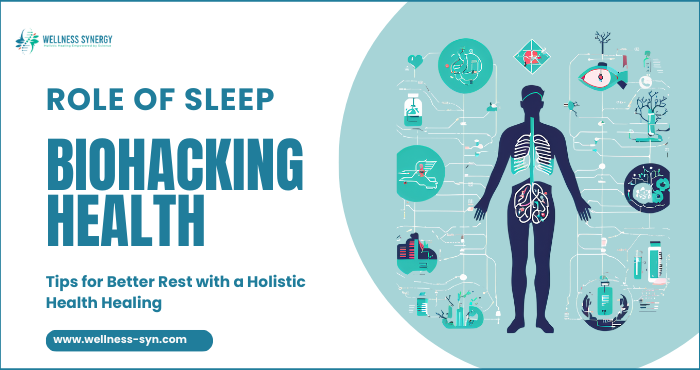Role of Sleep in Biohacking Health: Tips for Better Rest
In our busy lives, sleep often gets pushed aside, even though it’s crucial for our health. Many of us work hard all day, then crash into bed, hoping for rest but not always getting the quality sleep we need. This can leave us feeling drained, affect our performance, and cause health issues over time. As people look for ways to improve their well-being, biohacking—optimizing the body and mind—has gained popularity. An essential piece of this puzzle is recognizing how fundamental sleep is for holistic health healing and overall wellness.
Sleep is more than just a break for our bodies; it’s when we repair and recover. By improving the quality of our sleep, we can increase our energy, performance, and mood. If you’re looking to enhance your health, focusing on sleep is a key step.
Why Sleep is Important for Biohacking Health
Sleep helps our body and mind heal and stay healthy. It helps repair muscles, balance hormones, strengthen the immune system, and improve memory. Without enough good-quality sleep, these processes don’t work well, which can affect our health.
Here’s how sleep supports holistic health healing:
- Physical Health: Sleep helps muscles recover and repair. This is important for physical performance, whether you’re exercising or just doing daily activities.
- Mental Clarity: While we sleep, our brain clears out toxins, strengthens connections, and improves memory. This leads to better focus, creativity, and problem-solving.
- Emotions: Good sleep helps manage emotions and stress. Lack of sleep can make it harder to cope with challenges or cause mood swings.
- Immune System: Sleep boosts your immune system, helping you fight off illness.
- Hormones: Sleep affects hormones that control hunger, stress, and growth. Poor sleep can raise stress levels and make you feel hungrier.
Tips for Better Sleep
To improve your sleep and biohacking health, try making small changes to your routine:
- Create a Sleep-Friendly Environment
- Darkness: Make your bedroom dark. Use blackout curtains or an eye mask to block out light.
- Temperature: Keep your room cool, ideally between 60-67°F (15-20°C), to help signal to your body that it’s time to sleep.
- Noise: Reduce noise. If you can’t control it, try earplugs or a white noise machine.
- Stick to a Regular Sleep Schedule
Try to go to bed and wake up at the same time every day. This helps your body’s internal clock and improves sleep quality. Avoid staying up late on weekends. - Limit Screen Time Before Bed
Phones, tablets, and computers give off blue light, which messes with melatonin, the sleep hormone. Try not to use screens at least 30-60 minutes before bed. Instead, read or do something calming. - Avoid Heavy Meals, Caffeine, and Alcohol
Eating heavy meals late can cause discomfort. Caffeine and alcohol can also disturb sleep. Limit caffeine in the afternoon and avoid alcohol near bedtime. - Practice Relaxation Techniques
To unwind before sleep, try deep breathing, meditation, or light stretching. These can reduce stress and help you relax. - Consider Sleep Supplements
Some people find supplements like melatonin or magnesium help with sleep. Always talk to a doctor before trying new supplements. - Get Sunlight During the Day
Natural sunlight helps set your body’s internal clock. Try to get outside for at least 20 minutes a day, especially in the morning.
Conclusion
Prioritizing better sleep is a crucial part of your biohacking health journey, and it’s vital for holistic health healing. By making small changes to your environment and daily habits, you can sleep better and feel the positive effects on your physical, mental, and emotional well-being. Sleep isn’t a luxury—it’s essential for overall health. Whether you want to improve your focus, get better results from exercise, or just feel better, better sleep can help. With the right routine and mindset, you can unlock the full power of sleep for better health.
At Wellness Synergy, we believe in empowering individuals to prioritize their well-being, and better sleep is a key step toward achieving your healthiest self.
Disclaimer:
Wellness Synergy, its products, and Dr. Ilka Tamar do not intend to cure, treat, heal, or prevent diseases or illnesses. These statements have not been evaluated by the Food and Drug Administration. The information on our social media and website is for informational purposes only and is not a substitute for medical advice or diagnosis from your physician or other healthcare professional. This information is meant for general wellness purposes and does not claim to diagnose, treat, or cure any illness or health condition. If you suspect you have a medical issue, please contact your physician or healthcare provider.
FAQ: Role of Sleep in Biohacking Health
Why is sleep so important for biohacking health?
Sleep plays a critical role in maintaining physical, mental, and emotional health. It helps with muscle recovery, boosts the immune system, balances hormones, and improves brain function, including memory and focus. Optimizing sleep is essential for biohacking, as it directly impacts energy levels, performance, mood, and overall well-being.
How can sleep improve physical health?
During sleep, your body repairs muscles, restores energy, and supports various physiological functions. Adequate sleep enhances physical performance, promotes faster recovery after exercise, and reduces the risk of injury. It also helps regulate hormones related to hunger and stress, contributing to better health.
How does sleep impact mental clarity and brain function?
Sleep clears toxins from the brain, strengthens neural connections, and improves cognitive abilities such as memory, focus, and problem-solving. A good night’s sleep helps sharpen creativity and decision-making skills, making it essential for peak mental performance.
What are the emotional benefits of quality sleep?
Good sleep helps regulate emotions, making it easier to manage stress and navigate difficult situations. Lack of sleep can lead to mood swings, irritability, and difficulty coping with stress. By prioritizing rest, you can experience greater emotional stability and resilience.
How does sleep affect my immune system?
Sleep is critical for maintaining a strong immune system. During rest, your body produces cytokines, proteins that help fight infection and inflammation. Consistently getting enough sleep helps strengthen your body’s defenses and reduces the risk of illness.


